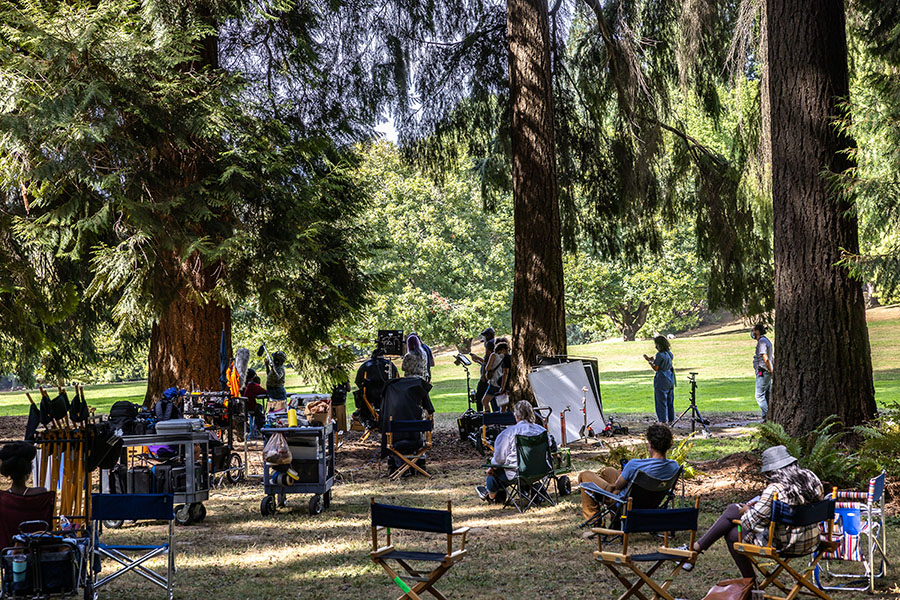The city’s intent is to lure more commercial and advertising shoots to the city, which some insiders say is a long time coming and could go further.
The City of Portland announced Tuesday that it will subsidize permit fees for all commercial and advertising shoots produced in the city through Dec. 31.
According to the city’s press release, the announcement was made possible through a collaboration between Commissioners Carmen Rubio and Dan Ryan, the Oregon Media Production Association, Oregon Film and the Portland Events and Film Office at Prosper Portland.
The city’s release noted film production and media industry has brought almost $700 million into the local economy over the last five years, and “further solidified Portland’s reputation as one of the top locations to produce movies, TV shows, and commercials.”
Mike Neal, co-chair of the Oregon Media Production Association’s advocacy committee and producer of the Oregon-filmed movie project Outdoor School, says he and co-chair Magdalene Serpa began reaching out to legislators over the summer with ideas about how to incentivize commercial film production once the actor’s strike began.
“A lot of people were surprised when I talked to them about the impacts of the strikes, because of course it’s not just the SAG members and the writers who are affected, it’s everybody involved in film production, from crew members to businesses like catering companies or lighting and camera rental companies. It’s a whole ecosystem,” Neal says. “We have a strong commercial industry here in Portland, so that’s been the one thing that has sort of kept people going.”
Neal says that according to the commercial producers he speaks with regularly, clients are always looking for ways to lower production costs. He says canceling permit fees will help Portland win bids over competing cities like Seattle, and that he hopes the announcement will “make some waves” among brands considering filming a commercial in Portland.
Serpa says commercial shoots will continue to be a lifeline for Portland’s film professionals even after the resolution SAG-AFTRA strike — which began in July and is ongoing, though as of Tuesday negotiators said they were close to a deal. The Writers Guild of America strike, which began in May and ended in September, completely shut down film production in Oregon, which during the 2021-22 fiscal year recorded $117 million in film, television, commercial and media production spending, according to the Oregon Film Office.
“Even if things get resolved quickly, it’s still probably not going to be until next year before people can start working,” Serpa says. “It might even be as late as March, so having something like this that’s going to incentivize work that people can do just shows that the state values its film industry,” says Serpa.
David Cress, producer of Oregon-made TV series Shrill and Portlandia, tells Oregon Business the news of the fee waiver is welcome, but the technicians, costumers, set crews, and other workers who make up Oregon’s film industry have been struggling for too long without enough work because of the summer’s strikes.
“I wish that it could have happened sooner. It felt it feels like we’ve been asking for a program like this for some time, and the two strikes have lasted 180-some days now. All the professionals here who rely on film are sort of casualties of these strikes,” Cress says. “Many of them have been for a year without work. Commercials can make up for part of that, but there was already a pretty saturated workforce for that. We’ve been after the city to increase our competitiveness in general. One question we ask is, why is it cheaper to shoot a commercial in Seattle than it is in Portland, Oregon?”
While Cress says he’s been able to find commercial work since the work stoppage began, he has seen his workload diminish 75% since the strikes began in May. He says the City of Portland still has more work to do to make Oregon competitive with its neighbors in attracting industrial shoots.
Tim Williams, president of the Oregon Film Office, says the amount commercial shoots can save based on this permit fee cancellation varies based on size and location, but that typical commercial shoots can save around $800 in some cases.
“Everyone’s competing for the most lucrative non-struck work, because things like short films and student films are not as financially supportive as something like a commercial job. This was a way to try to get commercial work to continue in Portland,” says Willaims. “This is a good thing to happen and I’m glad, but it’s also part of a much broader exploration of what we can do to help the industry overall both during the strike and after.”
Cress says Oregon could make itself more attractive to advertisers by lowering the threshold to qualify for the state’s film incentive program, and by extending the permit fee waiver through the end of the SAG-AFTRA strike. “It takes a little while even to plan a television commercial and two months is not a lot of time,” Cress says. “If we want to eliminate some of the suffering, we need to go past the normal capacity to make commercials. We would like to send a message to the commercial businesses and short-form businesses throughout the country that they should be thinking about Portland, and if they see two months, that might not have as much impact as if they could count on it for three or five or six months from now. I am excited about this program, and I very much applaud Commissioner Rubio and her office for getting it done for us really quickly once we went to them, but I do wish that the city would look more at that.”




